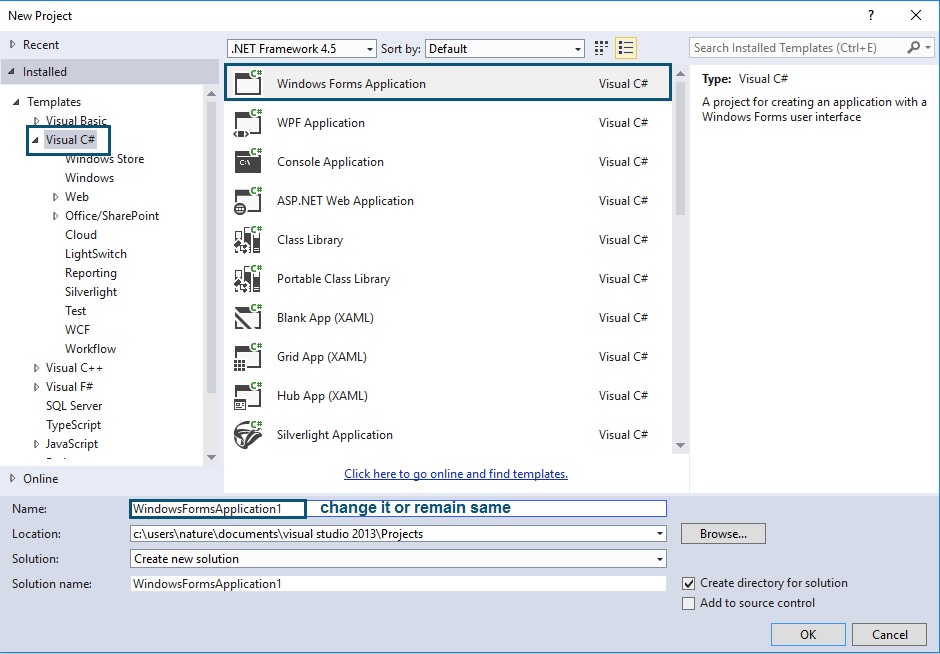How to create calculator in window application form c#
A simple calculator application in C# window form application. Here you will find easiest way to create a calculator in C# window form application.
Step 1.
Create a New window application form in Microsoft Visual Studio.

Step 2.
Design your Window Application Form like below form.

Step 3.
Now write the below coding in your application.
using System;
using System.Collections.Generic;
using System.ComponentModel;
using System.Data;
using System.Drawing;
using System.Linq;
using System.Text;
using System.Threading.Tasks;
using System.Windows.Forms;
namespace WindowsFormsApplication1
{
public partial class Form1 : Form
{
public Form1()
{
InitializeComponent();
}
string opr;
double oparand1, oparand2, result;
//button 1 coding
private void button2_Click(object sender, EventArgs e)
{
textBox1.Text = textBox1.Text + 1;
}
//button 2 coding
private void button3_Click(object sender, EventArgs e)
{
textBox1.Text = textBox1.Text + 2;
}
//button 3 coding
private void button4_Click(object sender, EventArgs e)
{
textBox1.Text = textBox1.Text + 3;
}
//button 4 coding
private void button5_Click(object sender, EventArgs e)
{
textBox1.Text = textBox1.Text + 4;
}
//button 5 coding
private void button6_Click(object sender, EventArgs e)
{
textBox1.Text = textBox1.Text + 5;
}
//button 6 coding
private void button7_Click(object sender, EventArgs e)
{
textBox1.Text = textBox1.Text + 6;
}
//button 7 coding
private void button12_Click(object sender, EventArgs e)
{
textBox1.Text = textBox1.Text + 7;
}
//button 8 coding
private void button11_Click(object sender, EventArgs e)
{
textBox1.Text = textBox1.Text + 8;
}
//button 9 coding
private void button10_Click(object sender, EventArgs e)
{
textBox1.Text = textBox1.Text + 9;
}
//button 0 coding
private void button9_Click(object sender, EventArgs e)
{
textBox1.Text = textBox1.Text + 0;
}
//dot button coding
private void button18_Click(object sender, EventArgs e)
{
if (textBox1.Text.Contains("."))
{
textBox1.Text = textBox1.Text;
}
else
{
textBox1.Text = textBox1.Text + ".";
}
}
private void button8_Click(object sender, EventArgs e)
{
textBox1.Text = textBox1.Text + 0+0;
}
//X button coding-clear code
private void button1_Click(object sender, EventArgs e)
{
textBox1.Text = "";
}
//plus button coding
private void button13_Click(object sender, EventArgs e)
{
oparand1 = Convert.ToDouble(textBox1.Text);
opr = "+";
textBox1.Clear();
}
//equal button coding
private void button17_Click(object sender, EventArgs e)
{
oparand2 = Convert.ToDouble(textBox1.Text);
switch (opr)
{
case "+": result = oparand1 + oparand2;
textBox1.Text = Convert.ToString(result);
break;
case "-":
result = oparand1 - oparand2;
textBox1.Text = Convert.ToString(result);
break;
case "*":
result = oparand1 * oparand2;
textBox1.Text = Convert.ToString(result);
break;
case "/":
if (oparand2 == 0)
{
textBox1.Text = "0.0";
break;
}
else
{
result = oparand1 / oparand2;
textBox1.Text = Convert.ToString(result);
break;
}
}
}
//multiply button coding
private void button14_Click(object sender, EventArgs e)
{
oparand1 = Convert.ToDouble(textBox1.Text);
opr = "*";
textBox1.Clear();
}
//minus button coding
private void button15_Click(object sender, EventArgs e)
{
oparand1 = Convert.ToDouble(textBox1.Text);
opr = "-";
textBox1.Clear();
}
//divide button coding
private void button16_Click(object sender, EventArgs e)
{
oparand1 = Convert.ToDouble(textBox1.Text);
opr = "/";
textBox1.Clear();
}
}
}
Output:

